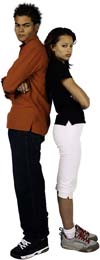|
Intermix.org.uk is a website for the benefit
of mixed-race families, individuals and anyone who feels they have a multiracial
identity and want to join us. Our mission is to offer a view of the mixed-race experience, highlighting icons, film, books, poetry, parenting techniques, celebrities, real lives and much more. Our online forums are a great place to meet others, ask questions, voice your opinions and keep in touch. Sign up for our monthly newsletter and delve into our pages. Want to join in? Become an Intermix member to take part: |
Korean Adoptees Rally Together
 2,000 transracially adopted every year.
2,000 transracially adopted every year.
With a gross domestic product of $679.6 billion last year, South Korea ranked as the world's 11th largest economy, yet every yeas about 2,000 South Korean children are adopted outside the country. Since the 1950s, American families have adopted about 110,000 South Korean children, with another 40,000 or so scattered worldwide.
At first, they were the mixed-race children of Korean women and U.S. soldiers. Now, they are most likely to be from poor families or be the children of single mothers because South Korea spends relatively little on Western-style social programs to support the needy.
In an effort to stem the exodus of children, the government has tried to encourage Koreans to adopt. May 11 is now national Adoption Day, and the government offers financial incentives to Korean families who adopt. But traditional reverence for familial bloodlines and the social stigmas attached to adoptees as well as children who are disabled, mixed race or born out of wedlock limit local enthusiasm for the program. Thus, international adoption continues to outpace domestic.
In the 1990s, the spread of the internet enabled adult Korean adoptees to find each other and organize themselves. Many started moving back to South Korea but struggled because although they looked like locals they didn't know anyone and even worse they didn't know the language. So they founded groups to help each other find home-stays, employment and their birth families.
When adoptees took over Seoul's Hippo Bar one recent evening, Dae Won Wenger, known as the 'father' of their community, worked the room with his digital camera. 'I want to support adoptees so they will not have so many problems, to help them adapt to Korea,' said Wenger, who grew up in Switzerland.
On weekends, he tells more than 100 adoptees by text message where to meet. He is their guide to Seoul, one of the world's largest cities, with a population over 10 million.
English is the adoptees' common language because many speak only basic conversational Korean. That night, a mixed-raceadoptee from Denmark talked about how his birth mother had asked the adoption agency to send him to the United States, where there were more blacks and he might be treated better. His mother dreamed that someday would enlist in the U.S. military and return to find her. A Dutch woman explained how she was scheduled to appear on a weekly television show to find her family.
Among their victories, the adoptees won the right to F-4 visas in 1999, which allows them to stay in South Korea indefinitely. Just like other native Koreans, adoptees with the visas are now allowed to buy land and open businesses, and they no longer need visa sponsors. Some universities also offer them scholarships for language classes, following adoptees' efforts to publicize their needs.
A small, passionate group is challenging international adoption, which they say strips South Korean adoptees of their cultural identity. They compare it to cultural genocide, akin to taking American Indian or aboriginal children from their communities and placing them with white families to 'civilize' them. Hoping to end international adoption from South Korea, founders of the 1-year-old Adoption Solidarity Korea hold monthly forums and lobby legislators.
The adoptees who have returned from abroad are 'the spark to trigger the social consciousness of Korean society,' according to the mission statement of an art installation called the 'Awareness Wall.' To be unveiled this fall in subways in Seoul, Gwangju and Busan, each exhibit will feature photos of 3,000 overseas Korean adoptees as babies and adults.
Looking for your adoptive family? Check out this useful guide.:
Source:
